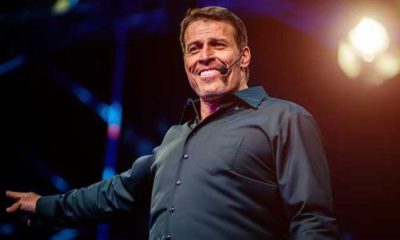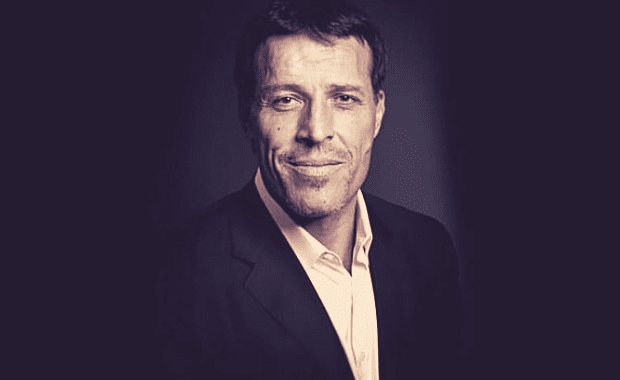Success Advice
10 Steps To Mastering The Art Of NLP

A number of highly acclaimed motivational speakers have implemented the art of NLP to train others how to re-program their mind for success. Motivational speakers such as Tony Robbins, Paul McKenna & Derren Brown have hit the road running with this style and have proven that this technique really does work.
Follow our 10 Steps to Successful NLP Mastery to achieve what you really want out of life.
The 10 steps to mastering NLP
1. Understand what you’re getting into
Mastering NLP is not an easy thing to do. Many – or more accurately – most people can’t even manage to control their brain enough to get them out of bed on time in the morning – let alone completely revamp the inner workings of their conscious mind. The lifelong pursuit of mastering NLP is nothing short of the lifelong pursuit over mastery of the self. This short guide will point you in the right direction towards that path.
2. Know what NLP is
Much disinformation has been spread about NLP, and for good reason; it’s dangerous. Not dangerous to you and me of course, but dangerous to the institutions which rely on people having problems to make money. The pharmaceutical industry, professional psychiatrists, psychologists, and the enormous “self-help” industry all rely on you needing someone or something, usually a product, to make you better.
3. Know how NLP works
We all know the story of the pink elephant. I say pink elephant and you think of a pink elephant. It’s inevitable. This simple idea of Garbage In Garbage Out (GIGO), to take a term from the computer industry, can be seen as the same exact basis for NLP. Instead of finger-pointing blame to your problems and then prescribing a solution (usually a pill), NLP recognizes that there is input coming into your brain, recognizes your ability to change it, and then gives you a technique with which to do so.
4. Know the history of NLP and how it has evolved over time
Richard Bandler and John Grinder perhaps did not know what they were getting into back in 1975 when they created NLP. Today NLP has spawned into a multi-million dollar business with practitioners all across the world. While NLP has evolved extensively into the modern day, it is always a good idea to go back and look at the origins of the techniques you see today.
5. Learn from the masters
When you think of NLP masters you might think of people like Richard Bandler, John Grinder, Tony Robbins, Paul McKenna, and Derren Brown. While these people have popularized NLP to the mainstream, if you are looking to master the basics it is probably best to look elsewhere. People like Connie Rae Andreas, Robert Dilts, Charles Faulkner and Shlomo Vaknin have all written excellent books about understanding and eventually mastering the concepts behind NLP.
6. Know that there is no one way to master NLP
Once you start to get involved very deeply with NLP you will start to learn that NLP is as open ended and rife with possibilities as the human mind itself. Want to eliminate fear completely? It is possible. Want to create your own “magnificent obsession” for working out? There is a skill for that. Think you can’t master astrophysics? Think again. Everyone has their own path and their own preferences; pick yours and use NLP as a tool, not as a bible.
7. Experiment
Once you understand the basics it is time to get dirty. If you are focusing on yourself get ready to get in touch with your innermost thoughts and emotions. For some people it may be the first time they’ve ever challenged their internal beliefs about the way they see the world, how they operate and what their capable of. I mean this as no exaggeration, it may be very scary what you can potentially find.
8. Create your own interpretation
Once you have begun to get familiar with how your brain works and have mastered the techniques already laid out by the founders of NLP, you are going to want to branch out. Remember there is no dogma for NLP. In the field of trying to consciously control how your brain works and subsequently creating a map, or an operating manual for the human brain, we are just beginning to scratch the surface.
9. Extend your limits
This is where things really get fun. When you realize that there is no limit to the potential of the human mind, what will you do? If you could become anyone you wanted, who would you be? If there is something that has not been done before, why not do it? For most people this too much. Learning a technique or two for eliminating a phobia will suffice for your layperson, but when it comes to mastering NLP, the ceiling is non-existent.
10. Have fun
This is probably the most important step. In between conquering the world, your fears and your craving for that coconut cream pie, remember the adventure will be what you make it. How you take to NLP should be exactly how you would ideally like to feel about life itself. Don’t make it “work”, don’t make it rigid, have fun and make it your own. This is where your success will come from.
NLP Video – Richard Bandler – What is NLP? Neuro linguistic programming.
Business
The Simple Security Stack Every Online Business Needs
Most small businesses are exposed online without realising it. This simple protection stack keeps costs low and risks lower.

Running a business online brings speed and reach, but it also brings risk. Data moves fast. Payments travel across borders. Teams log in from homes, cafés, and airports. (more…)
Business
If Your Business Internet Keeps Letting You Down, Read This
From smoother operations to better security, dedicated internet access is quietly powering today’s high-performing businesses.

Today, a dependable internet service is the bedrock for uninterrupted business operations. Many organizations rely on stable online connections for communication, data transfer, and customer interaction. (more…)
Did You Know
How Skilled Migrants Are Building Successful Careers After Moving Countries
Behind every successful skilled migrant career is a mix of resilience, strategy, and navigating systems built for locals.

Moving to a new country for work is exciting, but it can also be unnerving. Skilled migrants leave behind familiar systems, networks, and support to pursue better job opportunities and a better future for their families. (more…)
-

 News2 weeks ago
News2 weeks agoBrandon Willington Builds 7-Figure Business by Ignoring Almost Everything
-

 Health & Fitness3 weeks ago
Health & Fitness3 weeks agoWhat Minimalism Actually Means for Your Wellness Choices
-

 Did You Know3 weeks ago
Did You Know3 weeks agoWhy Most Online Courses Fail and How to Fix Them
-

 Business3 weeks ago
Business3 weeks agoIf Your Business Internet Keeps Letting You Down, Read This
-

 Business1 week ago
Business1 week agoEntrepreneur’s Guide to Pay Stubs: Why Freelancers and Small Business Owners Need a Smart Generator
-

 Business6 days ago
Business6 days agoThe Salary Shift Giving UK Employers An Unexpected Edge
-

 Business1 week ago
Business1 week agoThe Simple Security Stack Every Online Business Needs
-

 Scale Your Business7 days ago
Scale Your Business7 days ago5 Real Ways to Grow Your User Base Fast



























6 Comments